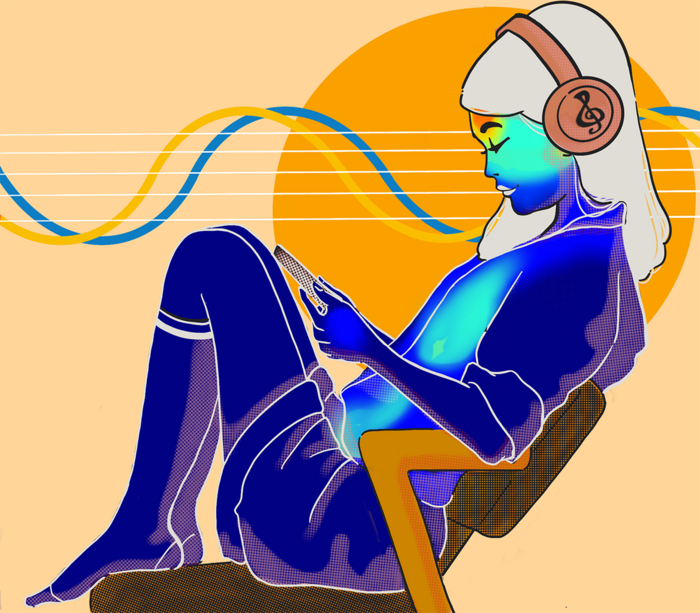Coldplay - Everyday Life
(Parlophone / Warner, since November 22)
Now, when everyone is amazed at how good this new Coldplay album is, that's a very poisoned compliment. Because it confirms once again how lousy the last two releases of the stadium pop band from London were, the unbearably emotional "Ghost Stories" and the equally unbearably happy "A Head Full of Dreams". The generic new album title "Everyday Life" was already set, before vocalist Chris Martin wrote down his general ignorance of the eponymous song: "What in the world are we going to do?" In his sensitively nasal singing voice, he sings it at the end of the eighth Coldplay LP, want it to be? Well, questions about questions.
By the high awareness factor alone of these verses one notices: "Everyday Life" is now the political Coldplay album, to which, let's be honest, nobody really waited. A statement about the terrible, bad state of our world, a sigh of sad acknowledgment for the crises and conflict zones of this world, from Africa over the USA to Syria and back to the USA (only in England everything seems to be toppi). For publication, the band played in the Jordanian Amman for sunrise and sunset, on tour, the climate-conscious musicians but only go, if this is ecologically sustainable. So maybe never again. Would be a reason for joy. Pardon.
"Sunrise" and "Sunset" are the two brackets that have given Coldplay their double album, according to their own announcement an inventory on "how we feel about things". On the cover is the band of the great-grandfather of guitarist Jonny Buckland from 1919 to see, there are many Arabic characters, a doo-wop song ("Cry Cry Cry"), a gospel ("BrokEn") and the sacred devotion "When I Need A Friend". How does this match the Lagos anthem "Èkó", the North African influenced "Arabesque" and guests like Femi, Feli and Made Kuti as well as the Nigerian singer Tiwa Savage? Or Alice Coltrane samples, the US-police violence of "Trouble In Town" or the actually very unfinished demo-version "WOTW / POTP"? Ask the musicians. It's just like what one of the planet's most successful bands feels right now.
Let's put it like this: One can interpret this oriental-occidental juxtaposition, the irritating contrast between worried accusation and pious naivete after the last very strict commercial orientation of Coldplay as a newly found joy in experimenting and praise the playful, laid-back. This is especially true for "Arabesque", which forces French vocals (by Stromae), Afro-Groove and a wild saxophone solo into a hypnotic track. But that does not make Coldplay Radiohead for a long time. Especially if this musical bandwidth should perhaps be offered more lyric than Martin's trivial, world-hugging knowledge: "We share the same blood" or the questionable statement: "Music is the weapon of the future"? Make peace with more weapons?
But that fits in with other textual slip-ups that thoroughly spoil any enjoyable fun on Everyday Life. In "Guns", for example, the notoriously poetic Martin tries to be a folk bard in the Dylan style. His (hopefully) satirical anti-gun rant, however, comes over so awkwardly that in the meantime gedülelten audience from the single in the worst case, only the counterproductive refrain "We need more guns" gets stuck. Although you should not underestimate the common Coldplay fan of course.
Andreas Borcholte's playlist KW 48
MIRROR ONLINE
Playlist on Spotify
1 Haim: Hallelujah
2 Hannah Diamond: Invisible
3 Tinashe: Hopscotch
4 Nasty Cherry: Brain Soup
5 Naima: Bienlein
6 Jadia: I do not have to do anything here
7 Schwaesta Ewa: Cruella
8 Xenia Rubinos: Diosa
9 Stefan Goldmann: Sofra
10 Sasami: lil drmr bb
Elsewhere, it gets even tasteless when Martin delves into a Syrian refugee girl (Rosaleem of the Damascene), that actually only wants to go booze with buddies - but unfortunately, the "Missile monsoon" makes her a fist in her homeland through the pub crawl pit, because the bombs are falling "boom ba ba boom". And now all! "Orphans" is the name of the well-meant, but unfortunately verkackte song - and is one of those co-produced by hit-writer Max Martin sing-along hymns, with which Coldplay worldwide arenas to euphorize. Very bad sign, if you are looking for Bono at such moments.
After U2's "Rattle & Hum" and other 80's Woke albums, "Everyday Life" stretches naturally, but the Eighties are over, and privileged, white, male rock bands are clearly no longer in the lead when it comes to formulate political attitudes and to trace complex migrant or minoritarian sensitivities. Unfortunately, then, one's own, diffused world-weariness will lead to a Christian pardon (eg "Church"), but today it is even more insensitive when it comes to demonstrating openness and cross-cultural togetherness.
At one point, in "Guns", Martin is probably right when he sings: Everyone's gone fucking crazy / Maybe I'm crazy, too. "Incidentally, the alleged first time that the cruel Coldplay use a force expression in one of their songs For this album, which was so brash and drunk with meaning on the world-bourgeois scandal, one could even think of more hearty words. (2.0) Andreas Borcholte
Tinashe - "Songs For You"
( Tinashe Music, since 21st November )
2014, the world looked different, even at Tinashe. At that time, the R & B musician from Los Angeles seemed on the highway to world fame to drive. Drake remixed her tracks, "MUST-KNOW" lists did not come out without her, her debut album "Aquarius" was among the best of the year. Tinashe understood it without a trace of effort to combine musical demand and mass suitability. The breakthrough into the mainstream? Seemed only a matter of time.
It came differently. Instead of breaking through, Tinashe steered her career to the guardrail with lead-foot - after the music industry manipulated the brake cables, mind you. In 2015, Tinashe wanted to push through the speedy release of her second album "Joyride" by releasing parts of it (and unsubscribing) to Soundcloud. Her then major label RCA thanked her with a ridden by all the rules of the art rollout of the plate. Tinashe then sold the title track to Rihanna, who then knocked it into the bin - and sold it back to Tinashe. "Joyride" then finally appeared in 2018. Stupid only: It interested nobody more. Especially since it sounded about as good as his genesis.
All the more surprising that none of this botch will be felt again a year later: "Is not no pressure, is not smoke", Tinashe sums up her current emotional balance in the second verse of "Feelings": No pressure, no combat smoke anymore. And yes, you can hear it, just in this first track of their third album. In the meantime, the artist and RCA went their separate ways, "Songs For You" now appears on their own indie label. Otherwise, the versatility of these 15 songs would probably not have been possible: In the course of more than 50 minutes, the album of bass roller rap on Spotify playlist R & B to K-pop uses a variety of influences, without ever the thread to lose.
Listened to on the radio
Wednesdays at 23 o'clock there is the Hamburger Web-Radio ByteFM an intercepted mixtape with many songs from the discussed records and highlights from the personal playlist of Andreas Borcholte.
On the contrary: in "Hopscotch" Tinashe flows weightlessly over well-lubricated West Coast basses. "Stormy Weather", on the other hand, is as skewed as if Thom Yorke had written it on Xanax. And "Save Room For Us" (feat. MAKJ) sparkles so cool, catchy yet zeitgeistig, as if Fleetwood Mac 1977 had already worked with Ableton and an 808 kit.
This is followed by an indispensable dancehall twist ("The A Little Bit"), soul-heavy slow jams ("Touch & Go", "Story Of Us), a song that somehow manages to hit Azealia Banks and Pharrell at the same time Williams remembers ("Perfect Crime") and finally a guitar-on-campfire ballad ("Remember When"), but above all, there are loads of hooks and tunes - and a great sense of songwriting that holds this colorful package together.
In the end you have to fall back on a phrase: "Songs For You" is actually a liberation. Tinashes music sounds as weightless again as on "Aquarius", she floats somewhere between crankiness and unconditional accessibility in her own sphere. Whether the breakthrough in the mainstream will come after all? Prefer not to talk about it. (8.4) Dennis Pohl
Stefan Goldmann: Veiki
(Macro Recordings, since November 22)
What if the techno-faucet did not invariably beat in four-four time? Boom, boom, boom, booze, as the bass drum has been calling for every night for 30 years. The Berlin DJ and producer Stefan Goldmann starts on "Veiki" the attempt of a shift. All nine tracks run with odd meters, you can count to 5, 7 or 9, until the clock starts again. Sounds like high school teacher Sting, who wants to make the dancers clever legs? Not correct. "Veiki" sounds like abstract Berlin techno that lingered long enough in the sun of south-eastern Europe to stagger interestingly: Spree goes Schwarzes Meer, Berlin concrete beats in the Balkan style.
Stefan Goldmann's mother is from Sofia, he grew up there partly, partly in Berlin-Marzahn. The usual musical travel route to the migration background would have been to place seemingly balcony-typical samples in cool sound spaces: here are a few semitone steps for the circling hip, there a small third for the bouncing heart. But Goldman avoids ethnicity and goes the other way: the beats are odd, but sound and arrangement remain as post-industrial as they are known from Detroit and Berlin (and certainly in Sofia). What is swinging differently is the pelvis. The first track is reminiscent of the Detroit Canadian Richie Hawtin from his time as Plastikman in the bass sound and sense of space, but the pulse in "Planinar" beats seven times per measure. It is a dance that surges beyond the quarter. Sometimes it floats, especially when the high synths distribute triples towards the end of this first piece, before disappearing into the bass and leaving only electronic ocean noise.
The metric expansion from four to five, seven and nine meter measures seems less obscure than one thinks. This is merely the assumption that every deviation from the Vierviertel is academic. The fact that almost everywhere else in the world other types of counting are perceived as organic by the body is forgotten. Here you can understand it in the self-experiment. Shoes off, at most the socks remain on. In the living room we climb climate-friendly into the techno jet and fly towards the Balkans. It bobs excellently to these tracks, rhythmically is just more going on. Sometimes an acoustic-sounding snare announces itself from the ground control, and how often with Goldmann the crew shakes a lot of wood percussion while the analog synths in the cockpit turn up their modulations. Creak does not bother anyone.
The dark, but playful tracks scrap past old Acid-House, as one likes it at the moment in the current production rooms. At Goldmann, it's not primarily rave signals, but only stations in the constant change of tracks. In the last third of the album, starting from "Makara", he raises the tempo a bit higher, but there is always room to breathe. Goldmann designed the material for the (f) t-Festival in Berlin, which he curates himself. He also played it at Mutek in Montreal, before he edited the tracks for the sound carrier. And what German disco makes him play this stuff on the dance floor? (8.5) Tobi Müller
Shed - "Oderbruch"
(Ostgut clay, from 29th of November)
Now it's time: Rainald Grebe on rave kick drum! With quacking frogs, clogged highways, sandy soils, oak forests and whatever else there is in Brann-buuurg. Exactly, the thunderbolt triad of all rear defenders, e-bike S-Bahn commuters, Bungalowaufhübscher and bacon belt earners around the German capital has now a new, stretched to album length anthem: "Oderbruch". The techno-producer René Pawlowitz, better known under the wooden name "Shed", has dedicated his new album to the former marshland in the border area between Germany and Poland.
Pawlowitz was born in Frankfurt / Oder, but grew up in Schwedt / Oder. In Berlin, he became a star of club music (his records appear at Ostgut Ton, the "Berghain label", and Monkeytown, the "fashion label label"), today he resides in Oderbruch again. So is this home tech techno? Back to the roots, forward in the forest?
You could easily interpret the album like that, and that would not be completely wrong. But in the nine tracks swing a lot more.
This is not music of the "Oder" but one of the "And". The album wants to be understood primarily as a fusion of biography and history. Let's start with a ride on the "B1 (beginning and end)" - the title of the first piece. Pawlowitz sets the Federal Highway 1, the east-west connection from Küstrin to Aachen, as a leaking gas-giving 130-km / h techno on fairly wide tires. Kraftwerk's highway concept art never really interested him, Pawlowitz explained a few years ago. But now he designs electronic music for traffic routes, waterways ("The Oder") and borderlines ("People and Walls").
The press release cites the course of the Eastern Front just before the end of the Nazi regime as well as the upheavals in the region after 1989. Repealed, both appear mixed with personal memories of childhood and youth, in a pathos that runs through all the pieces, regardless of whether with breakbeat goulash or string lard.
The combination of titles like "Dying Avenues" and "Mourning Willows" with the Ambivalence Ambient of "The Wolf Returns" shimmers between threat and euphoria. In some moments, it also spreads a bit of Bruhaha atmosphere. So it is often in the field of tension of (German) Techno and (German) nature: It is always fun, if the intentions behind it are the Bierernstesten that you can get in the Gesichtungs-Späti so. One compares to this, further potentiated by Wagnerianism and folklore, Wolfgang Voigt's GAS work from "Königsforst" to "Polkatrax".
But fun aside. "Oderbruch" evokes images of nature, in which, of course, it is thought that they would not exist without domestication and mediatization through technology. In the middle of the album, all this takes place for five minutes in a sound idyll - and a lonely culmination of pointillist track-title poetry: "Night, River, Grille, Car, Frog, Owl, Midge". Nobody will be able to say what is happening in this music in a more concise, precise and beautiful way. (7.7) Arno Raffeiner
Rating: From "0" (absolute disaster) to "10" (absolute classic)











/cloudfront-eu-central-1.images.arcpublishing.com/prisa/S7ERVSCT4FUVX6R7TUVBDNTH5Y.jpg)



